|
|
|
Sort Order |
|
|
|
Items / Page
|
|
|
|
|
|
|
| Srl | Item |
| 1 |
ID:
130892
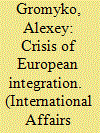

|
|
|
|
|
| Publication |
2014.
|
| Summary/Abstract |
Today, multipolarity and polycentrism are quantitatively and qualitatively different from their "prototypes" of historical periods of the past. Here it is necessary to single out three moments. First, Euro-centrism has been fading away in the past 20 years. Up to the 20th century, all the "concerts of powers" were based on the leading role of European states in international relations. Secondly, this new polycentrism is moving away from the straightforward dominance of the principle of force. The third moment, which characterizes the new-style multipolarity, is a phenomenon of international law that we have inherited from the 20th century.
|
|
|
|
|
|
|
|
|
|
|
|
|
|
|
|
| 2 |
ID:
176711
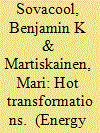

|
|
|
|
|
| Summary/Abstract |
The rapid decarbonisation of heat remains a challenging energy and climate policy priority. In this study, after screening 461 global case studies, we examine four national household transitions in heat, and examine their implications for governance. These transitions were both rapid, involving transformations in heat provision in a short timeframe of 18–35 years; and deep, involving diffusion that collectively reached more than 100 million households and more than 310 million people. From 1995 to 2015, China stimulated industrial research with strong municipal and national targets and policies to the point where they saw adoption rates for solar thermal systems surpass 95% market penetration in many urban areas. From 1976 to 2011, Denmark blended small-scale decentralized community control with national standards and policies to promote district heating so it reached 80% of household needs. From 2000 to 2018, Finland harnessed user and peer-to-peer learning, and innovation, alongside national and European policies and incentives so that heat pumps reached almost a third of all homes. From 1960 to 1977, The United Kingdom coordinated a nationalized Gas Council and Area Boards with industry groups, appliance manufacturers, installers and marketing campaigns so that gas central heating reached almost half of all homes. These four rapid case studies share commonalities in polycentric governance, rooted in (1) equity, (2) inclusivity, (3) information and innovation, (4) ownership and accountability, (5) organizational multiplicity, and (6) experimentation and flexibility. The study affirms that designing the right sort of political and governance architecture can be just as salient as technical innovation and development in stimulating transitions.
|
|
|
|
|
|
|
|
|
|
|
|
|
|
|
|
| 3 |
ID:
176712
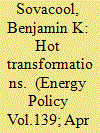

|
|
|
|
|
| Summary/Abstract |
The rapid decarbonisation of heat remains a challenging energy and climate policy priority. In this study, after screening 461 global case studies, we examine four national household transitions in heat, and examine their implications for governance. These transitions were both rapid, involving transformations in heat provision in a short timeframe of 18–35 years; and deep, involving diffusion that collectively reached more than 100 million households and more than 310 million people. From 1995 to 2015, China stimulated industrial research with strong municipal and national targets and policies to the point where they saw adoption rates for solar thermal systems surpass 95% market penetration in many urban areas. From 1976 to 2011, Denmark blended small-scale decentralized community control with national standards and policies to promote district heating so it reached 80% of household needs. From 2000 to 2018, Finland harnessed user and peer-to-peer learning, and innovation, alongside national and European policies and incentives so that heat pumps reached almost a third of all homes. From 1960 to 1977, The United Kingdom coordinated a nationalized Gas Council and Area Boards with industry groups, appliance manufacturers, installers and marketing campaigns so that gas central heating reached almost half of all homes. These four rapid case studies share commonalities in polycentric governance, rooted in (1) equity, (2) inclusivity, (3) information and innovation, (4) ownership and accountability, (5) organizational multiplicity, and (6) experimentation and flexibility. The study affirms that designing the right sort of political and governance architecture can be just as salient as technical innovation and development in stimulating transitions.
|
|
|
|
|
|
|
|
|
|
|
|
|
|
|
|
| 4 |
ID:
105802


|
|
|
|
|
| Publication |
2011.
|
| Summary/Abstract |
Drawing from work on governance, this article explores four programs and policies that respond in some way to the challenges induced by climate change and modern energy use. Relying primarily on original data collected from research interviews and field research in seven countries along with four case studies, the article notes that polycentric approaches - those that mix scales (such as local/national or national/global), mechanisms (such as subsidies, tax credits, and mandates), and actors (such as government regulators, business stakeholders, and members of civil society) - can foster equity, inclusivity, information, accountability, organizational multiplicity, and adaptability that result in the resolution of climate and energy related problems. After explaining its case selection and research methods, defining climate and energy governance, and conceptualizing polycentrism, the study explores cases related to electricity supply in Denmark, ethanol production in Brazil, small-scale renewable energy in Bangladesh, and off-grid energy use in China. It concludes by highlighting how polycentrism may enhance effective climate and energy governance, but that further research is needed to fully substantiate that claim.
|
|
|
|
|
|
|
|
|
|
|
|
|
|
|
|
| 5 |
ID:
107263


|
|
|
|
|
| Publication |
2011.
|
| Summary/Abstract |
This article is based on the author's report at the 10th Conference of Political Scientists from Russia, India, and China held in Moscow on September 20 and 21, 2010, that analyzed the current situation in the world and major changes already underway or about to happen in it largely because of polycentrism gaining ground across the globe. It shows the viability of the Russia-India-China format and the high potential the three countries' cooperation holds to resolve problems such as security and sustainable economic growth that have enormous significance for Asia and the Asia-Pacific Region.
|
|
|
|
|
|
|
|
|
|
|
|
|
|
|
|
| 6 |
ID:
185788
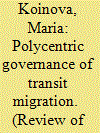

|
|
|
|
|
| Summary/Abstract |
State and non-state actors interact in both formal and informal ways during migration governance. Yet, we know little about such interactions, especially in the field of transit migration, a largely regional phenomenon. Here the categories of migrants are fluid between refugees, regular and irregular migrants, including those from conflict regions. Governance takes place also informally. Building on relational theories in International Relations, this article introduces a novel relational approach to polycentric governance. I argue that at the centre of such governance are not simply institutions or migration regimes, but power-laden relations among governmental, non-governmental, supranational, and non-state actors, as well as sending and destination states. These form architectures of partially official, partially informal dynamics that govern transit migration in a particular world region. Such architectures are based on mechanisms of cooperation, conditionality, containment, contestation, and others, combined in regionally specific ways. The mechanisms manifest themselves differently depending on how actors are embedded in places with different political regimes and statehood capacities. The article illustrates this relational perspective to polycentric governance with comparative evidence from the Balkans and the Middle East.
|
|
|
|
|
|
|
|
|
|
|
|
|
|
|
|
| 7 |
ID:
131850
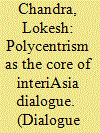

|
|
|
|
|
| Publication |
2014.
|
| Summary/Abstract |
The twentieth century was wrapped in gold plundered from a thousand flowers. It was consumerism at its height. It clothed the mind with physicality. This century seeks inner steppes, immense and pristine. We have to work out a journey to the innermost substance of being. People of Asia have to enshrine their vision and value in ever-creating, all-irradiating forms. We have to avoid to avoid the tragedy of becoming non-descript and monocentric, deprived of roots.
|
|
|
|
|
|
|
|
|
|
|
|
|
|
|
|
| 8 |
ID:
192482
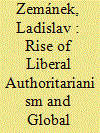

|
|
|
|
|
| Summary/Abstract |
The article deals with the transformation of the Western liberal democratic model
and international relations amid Cold War II. Sources of liberal authoritarianism
are identified, and the West’s ongoing authoritarian turn is conceptualized in
terms of postliberalism. The latter is scrutinized through the political West’s
efforts to protect liberal democracy and its values, and to establish global
Gemeinschaft of liberal democracies through containment, deterrence, and
encirclement. This process is seen as being interconnected with the intensifying
conflict between liberal and sovereign internationalism over the international
system. Whereas the political West asserts the rules-based order, the internally
heterogeneous Global Majority seeks to establish a polycentric model based
on the centrality of the UN Charter and the principles of peaceful coexistence.
Hegemonism is compared with the Global Majority’s emancipatory aspirations
that have led to the large-scale confrontation with the political West since 2022.
|
|
|
|
|
|
|
|
|
|
|
|
|
|
|
|
| 9 |
ID:
186602


|
|
|
|
|
| Summary/Abstract |
The aim of the study is to identify the role of the People’s Republic of China in the activities of the organisation, based on the Chinese vision of its role in the Shanghai Cooperation Organisation as one of the ideological and philosophical leaders that determine its focus and ideology. In particular, China implements the principle of polycentrism in Eurasia and interstate partnership and promotes the idea of state-regulated economic globalisation. The methodology of this scientific research is based on the analytical method of studying the issues related to the topic of the scientific research. China proceeds from the concept of ensuring full sovereignty by the member states of the organisation, but against the backdrop of low development rates of national economies (up to 2–2.5%) and lack of awareness by countries of their national interests in the region, Chinese business will strengthen its expansion, relying on both the World Trade Organisation rules and using protectionist measures by absorbing ineffective business entities. China is guided by the principles of non-interference in the internal affairs of other states, while maintaining its socio-political model based on the fusion of the communist ideology and the traditional philosophical doctrines of China and the mentality of the country’s population, excluding the democracy export policy, denying the desire for undivided hegemony and to rule the world community. This is confirmed by the main key elements of the People’s Republic of China’s foreign policy, determined by the Chinese leadership.
|
|
|
|
|
|
|
|
|
|
|
|
|
|
|
|
|
|
|
|
|